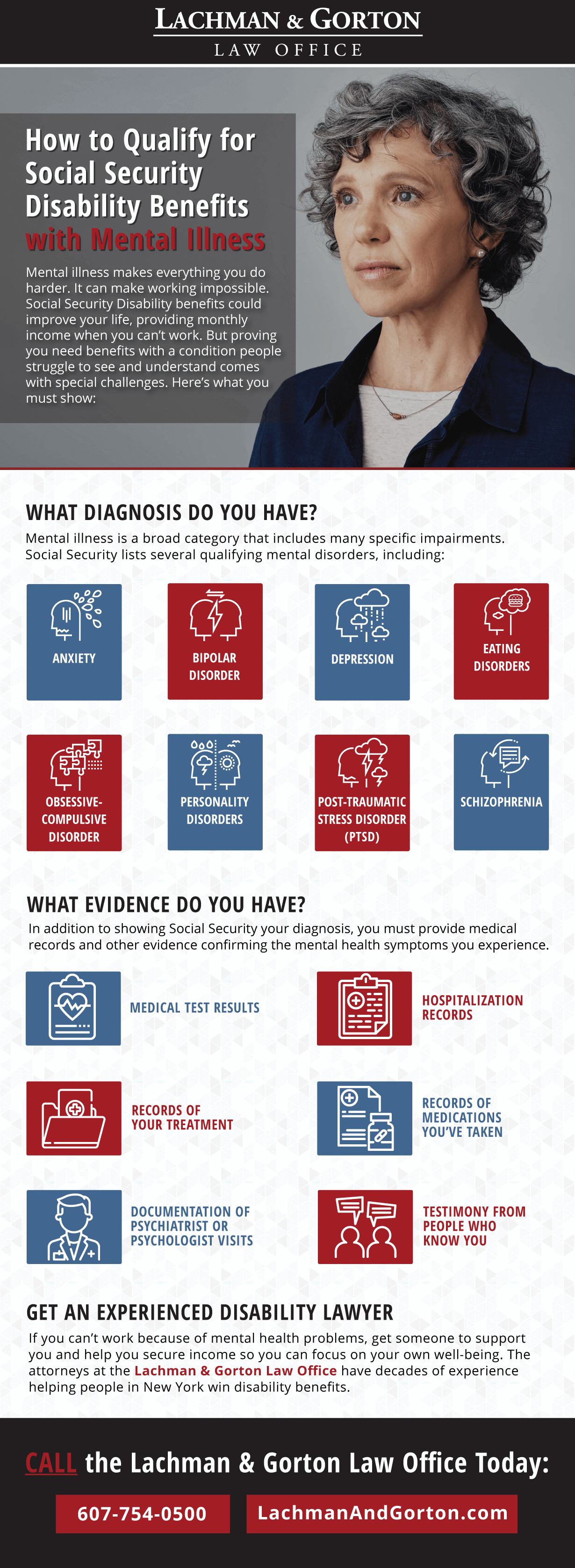Are Mental Illnesses Eligible For Disability Benefits?
- Posted on August 22, 2016
When you’re living with a serious mental illness, you’re all too familiar with the weight it adds to seemingly simple, ordinary tasks. It can make functioning in your job impossible—even when other people don’t understand because your condition isn’t physically visible.
You can get financial relief when you can’t work in the form of Social Security Disability benefits. These benefits provide monthly checks and qualify you for Medicare or Medicaid health coverage, so you can maintain a sense of independence through this difficult time.
But first, you have to prove your case.
That’s difficult to do alone. You deserve someone working for and supporting you, dedicated to helping you secure the benefits you deserve.
Lachman & Gorton Law Office can help you improve your chances of becoming eligible for Social Security Disability in Binghamton and around New York. We’ve helped thousands of people win benefits.
Which Mental Health Conditions Qualify for Disability?
Mental illness is different from many specific illnesses that can qualify you for disability benefits because it’s a broad category including many different disorders.
You could receive Social Security Disability for any of these and more:
- • Anxiety and obsessive-compulsive disorders
- • Depression, bipolar and related disorders
- • Post-traumatic stress disorder (PTSD)
- • Schizophrenia and other psychotic disorders
- • Intellectual disorders
- • Somatic symptom and related disorders
- • Personality and impulse-control disorders
- • Autism spectrum disorder
- • Neurodevelopmental disorders
- • Eating disorders
More than 9.8 million U.S. adults experience a mental illness that substantially affects their major life activities, according to the National Alliance on Mental Illness.
If that activity is your work, Social Security Disability benefits can help you maintain your dignity while you cope with your mental health.
The disability attorneys at Lachman & Gorton don’t charge anything to evaluate your claim for benefits.
How Do I Prove Mental Illness for Social Security Disability?
It’s devastating to get denied Social Security Disability benefits when you were counting on that support to survive. But the fact is, most people get denied when they first apply.
And mental illness comes with its own challenges. It often doesn’t manifest itself physically. Or it takes some time to become apparent to other people, making it harder to prove to claims examiners and others that you can’t work.
There’s also no clear root cause of mental illness. And the impact and severity of these conditions vary on a case-by-case basis.
A crucial component of your claim is documenting your symptoms. Common symptoms of mental illness include:
- • Apathy
- • Lack of appetite
- • Memory problems
- • Trouble focusing
- • Social withdrawal
- • Restlessness or hyperactivity
- • Difficulty sleeping or sleeping too much
The Social Security Administration requires “objective medical evidence” to prove that your mental illness constitutes a qualifying disability. This evidence includes:
- • Medical records such as test results
- • Hospitalization records
- • Treatment and medication information
- • Records of visits to psychiatrists or psychologists
- • Non-medical documentation, such as eye-witness reports from people who can attest to how your mental illness negatively impacts your ability to work
When Social Security Denies Your Disability Claim, What’s Next?
It’s easy to feel hopeless when your claim gets denied, but it’s important to remember that mental illness is one of the most common reasons people receive Social Security Disability benefits.
You’re not out of options. You can appeal. But act fast:
You have 60 days to file an appeal after your claim denial.
Appeals are complicated. Social Security has its own separate legal system for deciding disability appeals. Get a lawyer who knows that system.
Lachman & Gorton lawyers are well-versed in the nature and effects of mental illness, gathering the evidence you need and making your arguments to Social Security.
Our team is prepared to guide you through the appeals process and show Social Security that you meet its fundamental requirements for disability income for mental illness:
- • You’re unable to do the work you once did.
- • Your mental illness prevents you from switching to a different job.
- • Your condition will last at least a year, or could cause death.
At Lachman & Gorton, we take time to understand your condition, your claim and your needs. And we don’t charge any fee for our services until you win.
Your life can improve with Social Security Disability benefits.


